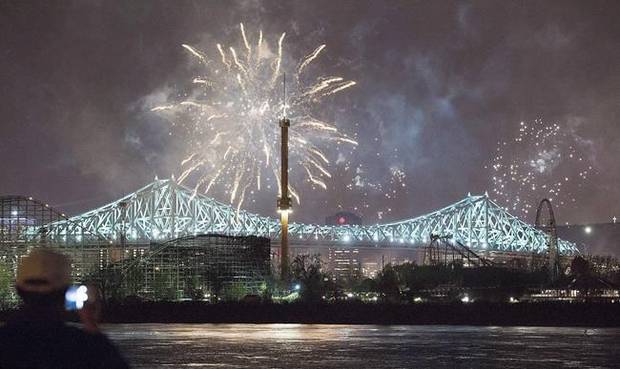The two fugitives run through the woods, pursued by British redcoats. One is shot dead while crossing a stream, and the other scrambles up a hill, eventually collapsing from his wounds. The English commander comes level with his troops and their quarry, draws his pistol and executes the man where he lies.
That scene depicting the revolt of Quebec Patriotes in 1837 is a shocking exception to the mostly uplifting stories in François Girard's new feature film, Hochelaga: Terre des âmes. It's also one of the few reminders to come out of Montreal's big commemorative year – the city's 375th anniversary, and Canada's 150th – of an irredeemably feel-bad episode in the province's history.
A scene from Francois Girard’s new movie Hochelaga, tracing the history of Montreal.
For all the rah-rah about celebrating the past, 2017 in Montreal was often about trying not to remember the many difficult, unresolved and possibly unresolvable issues rooted in historic events. Time and again, the festivities avoided the hard memories, or skipped the history stuff altogether.
Cité mémoire projected historic vignettes on walls all over Old Montreal, including a half-hour Grand Tableau just for the 375th anniversary. But it missed a bittersweet chance to bring Charles de Gaulle back to the balcony of City Hall, from which he had shouted " Vive le Québec libre!" 50 years earlier. It cast none of its lights on the old Pied-au-Courant prison, where 1,300 Patriotes were jailed, and some executed.
Montréal Avudo, a 3-D light and water extravaganza that played two shows a night in the Old Port during the summer, purported to tell significant tales from the history of the St. Lawrence. It somehow forgot about the night in 1759 when General Wolfe surprised General Montcalm by scaling a cliff from the river for the battle that ultimately led to British colonial rule.
It's almost as if these projects were devised to pay tacit tribute to writer Jean Bouthillette's observation, in an influential 1972 essay, that in all the events that matter, Quebec's history is "a wound that never heals." The remark is cited in historian Yvan Lamonde's melancholic essay, Un coin dans la mémoire (2017), in which he muses on the fatigue and sense of blockage that history has bred into the bones of Quebeckers.
It was obvious from the beginning how MTL375 planned to route around that. Historians and museums complained about how little commemoration was included in events planned by Just for Laughs co-founder Gilbert Rozon's MTL375 committee. They didn't seem to realize that the goal was to throw a party that would make serious remembrance unnecessary.

Fireworks explode over an illuminated Jacques Cartier Bridge on May 17, 2017, to celebrate the city’s 375th birthday.
Graham Hughes/The Canadian Press
The ideal expression of this amnesia was also the fête's most expensive project: the lighting of the Jacques Cartier Bridge. A historic structure became the skeleton for a $39.5-million installation fixated on the passing moment, via software that translates social-media activity into flickering lights.
Hochelaga, which reached Quebec cinemas last week, acknowledges the anniversary year by cheekily doubling its span – not just 375 years, but 750. It makes a big effort to indigenize Montreal's history, though its portrayals of contacts between Iroquoian peoples and those of New France are entirely loving or benign. There's no room, say, for Montreal's 200-year market in Indigenous slaves, or the steady chipping away at Mohawk reserve land at nearby Kahnawake, which is now about half its original size.
The film Hochelaga makes a big effort to portray of contacts between Iroquoian peoples and those of New France as entirely loving or benign. The negative side of this history is ignored.
The film's subtitle is a punning reference to Terre des hommes, the thematic name for Expo 67, which turned out to be everyone's favourite round-number memory of 2017. Expo satisfied because it was an isolated event that seemed to present Montreal as its own, ultra-modern city-state. Like de Gaulle's visit, Expo allowed Québécois aspirations to be heard internationally, without any filtering by Ottawa. Both events were a holiday from unending dickering with, and about, the rest of Canada.
Everyone was reminded of that fraught dialogue in May, when Prime Minister Justin Trudeau rejected Quebec Premier Philippe Couillard's 177-page case for renewing constitutional discussions, apparently without reading it. That was the year's feel-bad work of political theatre – Happy Canada 150, Quebec! – and it emphasized how stuck the province is. Two failed independence referendums closed off a sovereign future; two failed constitutional reforms thwarted ratification of the country's core document. No way forward, and no way back.
Quebeckers definitely take pride in their customs and heritage, and in some versions of their history. On Wednesday, the Radio-Canada radio program Aujourd'hui l'histoire ran a segment about Philippe-Joseph Aubert de Gaspé's historical novel, Les anciens canadiens, a smash hit when it was published in 1863 and still in print. The book's rosy depiction of New France remains popular in part because it deflects from the actual burdens of the past upon the present. Plus ça change….